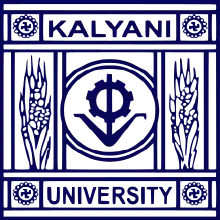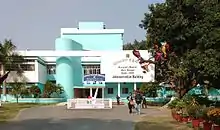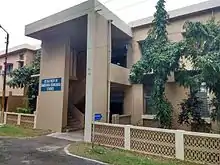University of Kalyani
The University of Kalyani, established in 1960, is a state-government administered, affiliating and research university in Nadia district of West Bengal, India. It offers courses at the undergraduate and post-graduate levels.
 | |
| Type | Public |
|---|---|
| Established | 1960 |
| Chancellor | Jagdeep Dhankhar |
| Vice-Chancellor | Manas Kumar Sanyal |
| Students | 6,346[1] |
| Undergraduates | 717[1] |
| Postgraduates | 5,487[1] |
| 142[1] | |
| Location | , , 741235 , 22.9726984°N 88.4339285°E |
| Campus | Semi Urban |
| Acronym | KU |
| Affiliations | UGC, NAAC, AIU, AICTE |
| Website | www |
.jpg.webp)
History
The university was established on 1 November 1960 by the Kalyani University Act 1960 of the state of West Bengal. The University of Kalyani is a State- University and its activities are guided by the Kalyani University Act, 1981 (amended up to 2001), enacted by the Govt. of West Bengal. The Act is supplemented by 'Statutes', 'Ordinances','Regulations' and 'Rules'. This act replaced 'The Kalyani University (Temporary Suppression) Act, 1978, which in turn replaced 'The Kalyani University Act, 1960. The University Grants Commission accorded recognition to the university.[2][3][4]
Campus
The university is placed in an urban setting touching the boundaries of some green rural areas. The eastern bank of the Ganges is only 2000 meters from the University and its serene background is only 50 km from Kolkata. It is close to Kalyani Ghoshpara railway station, 10 minutes walking distance to Administration Building from the station, and the other campuses are around it. During Second world war this land was under the control of the American army who maintained an army depot here. Few roadways and other constructions are still there to prove that past history. The Campus spans over a huge area of 400 acres (largest state university of West Bengal.)
Organisation and administration
Governance
The Vice-chancellor of Kalyani University is the chief executive officer of the university. In 2020 Manas Kumar Sanyal was appointed as Vice-chancellor of the university.[5][6]
Faculties

- Faculty of Science
- Faculty of Engineering, Technology & Management
- Faculty of Arts & Commerce
- Faculty of Education
- Faculty of Music & Fine arts
Faculty of Science The faculty consists of the departments of-
- Biochemistry & Biophysics
- Bioinformatics
- Botany
- Chemistry
- Ecological Studies
- Environmental Science
- Geography
- Mathematics
- Microbiology
- Molecular Biology & Biotechnology
- Physiology
- Physics
- Statistics
- Zoology
Faculty of Engineering-Technology & Management

The faculty consists of the departments of-
- Department of Engineering & Technological Studies
It offers Bachelor of Technology (B.Tech) in the following courses:
- Information Technology
- Electronics and Instrumentation Engineering
- Department of Computer Science & Engineering
It offers Master of Technology (M.Tech) in the following courses:
- Computer Science and Engineering
- Communication Engineering
- Department of Business Administration
It offers a full time 2 year course of MBA, Master of Business Administration
Faculty of Arts and Commerce
The faculty consists of the departments of.
- Adult & Continuing Education
- Bengali
- Commerce(Accounting & Information Systems, Finance & Banking, Management, Marketing)
- English
- Economics
- Folklore
- Hindi
- History
- Home Economics
- Library and Information Science
- Modern Languages & Linguistic
- Political Science
- Philosophy
- Sociology
- Social & Cultural Analysi
Faculty of Music and Fine Arts The faculty consists of the departments of.
- Visual Arts
Centers
- Bioinformatics Infrastructure Facility Center (BIFC)
- Center for Information Resource Management (CIRM)
- Center for Foreign Scholarship
- Center for Cultural Studies
- Center for Modern Languages
- Center for Social & Rural Development
- Center for Research and Innovation
- Center for Wildlife Ecology and Conservation
- Center on Environmental Biotechnology(ENVIS)
- Centre for Adult Continuing Education and Extension(ACE&E)
- International Centre of Ecological Engineering(ICEE)
Affiliated Colleges
This university is providing academic guidance and leadership to 48 affiliated colleges (20 in Nadia, 27 in Murshidabad and 1 in North 24 Parganas). Colleges are independent from the university but they follow the course curriculum of the university. Colleges are headed by the principal and teachers of the colleges are appointed via West Bengal college service commission. Colleges have responsibility for admitting undergraduates and organising their classes.
Academics
Accreditation
In 2016 University of Kalyani has been awarded A grade (CGPA 3.12) by the National Assessment and Accreditation Council (NAAC).[7]
Achievements
Hepatitis C nosode was developed by Rajesh Shah with a group of Molecular Biologists at the University of Kalyani, where it was demonstrated that the nosode sourced from Hepatitis C virus could produce anti-cancer effect on cell lines in a laboratory model. This was one big achievement by the biologists in the field.[8]
Rankings
| University and College rankings | |
|---|---|
| General – India | |
| NIRF (Overall) (2020)[9] | 75-90 |
| NIRF (Universities) (2020)[10] | 89 |
The university was ranked 89 among universities in India by the National Institutional Ranking Framework (NIRF) in 2020[10] and in the 75-90 band overall.[9]
Alumni
- Arijit Singh, Indian Playback Singer
- Ritwik Ghatak, Indian Film Director
- Prafulla Chandra Ray, Indian Chemist
- Sudip Bandopadhyay, Member of the Parliament
- Babar Ali, Indian Teacher
- Dwijendralal Ray, Indian Poet
- Swadhin Kumar Mondal, Indian Scientist
- Koushik Kar, Indian Actor
- Mihir Kanti Chaudhuri, Indian Chemist
- Anil Biswas, Indian Politician
- Bimalendu Sinha Roy, Indian Politician
- Biplab Pal, Indian Mathematician
- Arup Ray, Indian Engineer
- Kaushik Bhattacharya, Indian Dramatist and Writer
- Swasti Mitter, Indian Economist
- Amber Mitra, Indian Teacher
- Manoj Chakraborty, Indian Politician
- Hemanta Kumar Sarkar, Indian Author
See also
References
- "University of Kalyani Data for NIRF 2020" (PDF). NIRF Jun 11, 2020. Retrieved 27 June 2020.
- "List of State Universities, University Grants Commission".
- "List of State Private Universities".
- "Total No. of Universities in the Country as on 25.05.2016" (PDF).
- "Vice-chancellor".
- Kunal (18 December 2020). "WB Gov Appoints Manas Kumar Sanyal as new VC of Kalyani University". Azad Hind News. Retrieved 22 December 2020.
- "Institutions Accredited / Re-accredited by NAAC with validity" (PDF). National Assessment and Accreditation Council. Archived from the original (PDF) on 12 May 2012. Retrieved 22 February 2012.
- Mondal, Jesmin; Das, Jayeeta; Shah, Rajesh; Khuda-Bukhsh, Anisur Rahman (2016). "A homeopathic nosode, Hepatitis C 30 demonstrates anticancer effect against liver cancer cells in vitro by modulating telomerase and topoisomerase II activities as also by promoting apoptosis via intrinsic mitochondrial pathway". Journal of Integrative Medicine. 14 (3): 209–218. doi:10.1016/S2095-4964(16)60251-0. PMID 27181128.
- "National Institutional Ranking Framework 2020 (Overall)". National Institutional Ranking Framework. Ministry of Education. 11 June 2020.
- "National Institutional Ranking Framework 2020 (Universities)". National Institutional Ranking Framework. Ministry of Education. 11 June 2020.